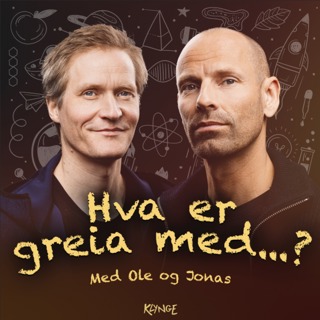
Origins of Life | Anna Wang on Artificial Cells and Nano-Robots
Origins of life researcher Anna Wang takes us on a fascinating journey through the latest theories about how life began, revealing why Darwin's "warm little ponds" are making a comeback and how ocean spray droplets may have served as nature's first test tubes. She explains why early cell membranes were more like soap bubbles - fragile and leaky - and how these imperfections were actually crucial for primitive life to function.The conversation explores the cutting edge of synthetic biology, where scientists are attempting to build artificial cells from scratch. Wang shares illuminating analogies, comparing their work to vegan cooking where researchers must recreate sophisticated biological processes without using modern cellular ingredients. She also discusses the ultimate goal of creating truly evolving systems, while acknowledging both the excitement and concerns surrounding such an achievement. Throughout the discussion, Wang emphasizes how the complexity of biological systems requires collaboration between physics, chemistry, and biology to unlock the mysteries of life's origins.01:58 The Current State of Origin of Life Research04:47 Challenges in Building Life from Scratch12:28 Energy Sources and Membrane Dynamics41:22 Membrane Dynamics and Chemical Gradients48:42 Challenges in Synthetic Biology59:16 Silicon in Biological Systems01:14:37 Reflections and Future AspirationsFOLLOW US ON SOCIAL:Twitter @ https://x.com/632nmPodcastSubstack: https://632nmpodcast.substack.com/Michael Dubrovsky @ https://x.com/MikeDubrovskyMisha Shalaginov @ https://x.com/MYShalaginovXinghui Yin @ https://x.com/XinghuiYinSUBSCRIBE:Apple Podcasts: https://podcasts.apple.com/us/podcast/632nm/id1751170269Spotify: https://open.spotify.com/show/4aVH9vT5qp5UUUvQ6Uf6ORWEBSITE: https://www.632nm.com
30 Des 20241h 15min

The Future of Fusion | Dennis Whyte on Nuclear Fusion and MIT Plasma Science
MIT Professor Dennis Whyte's path to becoming a fusion energy pioneer began with an unlikely source - a Ripley's Believe It or Not comic strip he read as a teenager in rural Saskatchewan. The comic described how a bottle of water could theoretically contain the energy equivalent of 100 barrels of oil through fusion, sparking a lifelong fascination that would shape his career.This fascination led Whyte to write his first high school paper on fusion energy and eventually become the first PhD student working on Canada's groundbreaking fusion project with Hydro Quebec. Now as Director of MIT's Plasma Science and Fusion Center, Whyte is leading cutting-edge research in fusion energy, including the development of revolutionary high-field magnets that could make commercial fusion power a reality.Our conversation highlights his journey and how curiosity and inspiration led to a scientific career helping solve one of humanity's greatest challenges.01:40 Dennis' Journey into Fusion Research05:43 Understanding Fusion Reactions and Challenges15:02 Containing 100 Million Degree Plasma36:01 Why Deuterium-Tritium is the Sweet Spot45:08 Understanding Plasma and Bremsstrahlung Radiation52:45 Fusion Power Plant Challenges and Innovations01:31:36 Fusion Challenges and Material Science02:07:39 The Future of FusionFOLLOW US ON SOCIAL: Twitter @ https://x.com/632nmPodcastSubstack: https://632nmpodcast.substack.com/Michael Dubrovsky @ https://x.com/MikeDubrovskyMisha Shalaginov @ https://x.com/MYShalaginovXinghui Yin @ https://x.com/XinghuiYinSUBSCRIBE: Apple Podcasts: https://podcasts.apple.com/us/podcast/632nm/id1751170269 Spotify: https://open.spotify.com/show/4aVH9vT5qp5UUUvQ6Uf6ORWEBSITE: https://www.632nm.com
23 Des 20242h 51min

Origins of Life | Jack Szostak on Basement Experiments to Nobel Prize-Winning Discoveries
Nobel laureate Jack Szostak takes us on a fascinating journey through his remarkable scientific career, from conducting dangerous chemistry experiments in his basement as a curious child to making groundbreaking discoveries about telomeres that would earn him the Nobel Prize. He reveals how a forgotten DNA sample in his freezer led to fundamental insights about chromosome stability, and explains why studying unusual organisms often leads to the biggest scientific breakthroughs.Beyond his work on telomeres, Szostak shares his current research into life's origins, including revolutionary ideas about how the first cells might have emerged and replicated their genetic material. He discusses his personal approach to choosing research directions, preferring to work in less crowded fields where he can think deeply about problems rather than competing in trendy areas. This philosophy, combined with his willingness to cross disciplinary boundaries, has enabled him to make transformative contributions across multiple fields of science.02:03 Early Career and Interest in Genomics03:32 Hot Topics in Biology and DNA Research05:40 Telomeres and Chromosome Behavior13:48 Telomerase and Its Role in Aging and Cancer18:12 Exploring Life Extension and Aging30:19 Origins of Life and Prebiotic Chemistry43:22 Challenges in Replicating Early Cells47:00 Exploring Protocells and Synthetic Biology54:51 Environmental Conditions for Origin of Life01:06:23 Interdisciplinary Approaches and Future Directions01:25:23 Final Thoughts and ReflectionsFOLLOW US ON SOCIAL:Twitter @ https://x.com/632nmPodcastSubstack: https://632nmpodcast.substack.com/Michael Dubrovsky @ https://x.com/MikeDubrovskyMisha Shalaginov @ https://x.com/MYShalaginovXinghui Yin @ https://x.com/XinghuiYinSUBSCRIBE:Apple Podcasts: https://podcasts.apple.com/us/podcast...Spotify: https://open.spotify.com/show/4aVH9vT...WEBSITE:https://www.632nm.com
16 Des 20241h 26min

The God Particle | Christoph Paus on Higgs Boson, CERN, and CMS
Professor Christoph Paus, a key figure in the discovery of the Higgs Boson at CERN's Large Hadron Collider, discusses his journey in high-energy physics, the challenges of leading large international collaborations, and the future of particle physics. As one of the co-conveners of the CMS Higgs physics group during the historic discovery, Paus provides unique insights into how the detection of this elusive particle was achieved through careful experimental design, data analysis, and team coordination.He explains the Standard Model of particle physics, the significance of the Higgs field and boson, and explores current mysteries like dark matter and antimatter asymmetry. The conversation also covers future collider technologies, from circular and linear accelerators to speculative space-based systems, and the ongoing quest to probe higher energy frontiers.02:24 Understanding the Standard Model08:32 Challenges and Mysteries in Physics11:46 The Higgs Field and Its Implications18:57 Journey into Physics: From Engineering to Higgs22:26 Early Days in High-Energy Physics34:14 Leading Large-Scale Physics Collaborations51:59 Balancing Project Goals and Individual Interests53:07 Community Reviews and Prioritization55:50 The Role of Machine Learning in Physics56:53 Challenges in Discovering the Higgs Boson01:06:07 Future Collider Technologies01:34:51 Exploring Dark Matter and Dark Sectors01:35:33 Current Anomalies in Physics01:40:19 Concluding Thoughts and Future ProspectsFOLLOW US ON SOCIAL:Twitter @ https://x.com/632nmPodcastSubstack: https://632nmpodcast.substack.com/Michael Dubrovsky @ https://x.com/MikeDubrovskyMisha Shalaginov @ https://x.com/MYShalaginovXinghui Yin @ https://x.com/XinghuiYinSUBSCRIBE:Apple Podcasts: https://podcasts.apple.com/us/podcast/632nm/id1751170269Spotify: https://open.spotify.com/show/4aVH9vT5qp5UUUvQ6Uf6ORWEBSITE:https://www.632nm.com
9 Des 20241h 42min

Cold Atoms: Mikhail Lukin on Quantum Optics and Neutral Atom Computing
In this episode, Harvard Professor Mikhail Lukin discusses his pioneering work in quantum computing using neutral atoms. He shares the journey from his early work in quantum optics and electromagnetically induced transparency to developing programmable quantum processors using arrays of individually trapped atoms. Lukin explains key breakthroughs in quantum error correction and how his team achieved unprecedented control over large numbers of quantum bits. He also discusses the fundamental challenges of building practical quantum computers and his optimistic outlook for the field's future.01:16 Early Career and Breakthroughs01:55 Understanding Lasers and Population Inversion03:37 The Birth of Quantum Computing04:21 The Evolution of Laser Technology06:52 The Impact of Bose-Einstein Condensates08:20 First Experiments at Harvard11:51 Challenges in Quantum Computing20:28 Quantum Error Correction28:39 The Role of Rydberg Atoms29:46 Building a Quantum Computer39:34 Overcoming Skepticism and Funding Issues40:46 Technical Innovations in Quantum Computing48:27 Future of Quantum ComputingFOLLOW US ON SOCIAL:Twitter @ https://x.com/632nmPodcastSubstack: https://632nmpodcast.substack.com/Michael Dubrovsky @ https://x.com/MikeDubrovskyMisha Shalaginov @ https://x.com/MYShalaginovXinghui Yin @ https://x.com/XinghuiYinSUBSCRIBE:Apple Podcasts: https://podcasts.apple.com/us/podcast...Spotify: https://open.spotify.com/show/4aVH9vT...WEBSITE:https://www.632nm.com
2 Des 202450min

Einstein Was Wrong: John Clauser on Bell's Theorem and the Nature of Reality
In this episode, we sit down with Nobel laureate John Clauser to discuss his experiments from the early 1960’s, testing Bell's inequalities and quantum entanglement. Clauser shares the story of how, as a graduate student, he proposed testing quantum mechanics against Einstein's local realism - an idea that most prominent physicists, including Richard Feynman, dismissed as a waste of time. Despite the skepticism, Clauser persisted and conducted the first experimental tests that showed quantum mechanics was correct and Einstein was wrong about quantum entanglement.Clauser walks us through the technical challenges of the experiments, from building equipment from scratch on a minimal budget to collecting data over hundreds of hours—using punch cards and paper tape. He also discusses the philosophical implications of quantum mechanics and his current views on climate science.02:29 The Birth of Bell's Theorem05:00 The Struggle to Prove Einstein Wrong08:13 The Evolution of Quantum Mechanics Testing13:15 Understanding Quantum Entanglement22:14 The Historical Context of Quantum Mechanics34:56 The Wave-Particle Duality Debate41:01 Experimental Challenges and Breakthroughs01:09:06 Polarizer Angles and Experimental Errors01:11:57 Philosophical Implications of Quantum Entanglement01:13:54 Plasma Physics and Particle Interactions01:24:29 Quantum Communication and Networking01:28:15 Fusion Research and Cold Fusion Controversy01:32:59 Critique of Climate Change Science01:50:46 Advice for Young Scientists01:53:59 Reflections on Experimental Physics and CareerFOLLOW US ON SOCIAL:Twitter @ https://x.com/632nmPodcastSubstack: https://632nmpodcast.substack.com/Michael Dubrovsky @ https://x.com/MikeDubrovskyMisha Shalaginov @ https://x.com/MYShalaginovXinghui Yin @ https://x.com/XinghuiYinSUBSCRIBE:Apple Podcasts: https://podcasts.apple.com/us/podcast...Spotify: https://open.spotify.com/show/4aVH9vT...WEBSITE:https://www.632nm.com
25 Nov 20242h 9min

The Science of Drug Discovery: Insights from Artem Evdokimov
In this episode, drug discovery scientist Artem Evdokimov discusses the science of pharmaceutical development, from historical breakthroughs to the current landscape. He shares insights on antibiotics resistance, the obesity drug Ozempic, and technical details of drug screening methods like DNA-encoded libraries. The conversation covers the economics of drug development, the potential of AI, and broader philosophical questions about human health and medicine. Evdokimov emphasizes the importance of avoiding oversimplification in science while highlighting both the triumphs and ongoing challenges in pharmaceutical research.03:18 Historical Roots of Medicine05:33 Evolution of Drug Delivery Methods12:52 Modern Drug Discovery and Challenges45:39 Understanding the Drug Discovery Process47:30 Challenges in Gene Therapy49:26 Complexities of Human Physiology53:14 The Role of Receptors and Hormones01:28:12 The Selenium Shortage and Shampoo Dilemma01:28:54 Challenges in Drug Manufacturing and Distribution01:34:23 Antibiotic Resistance: A Growing Concern01:45:18 The Future of Drug Discovery and AI02:11:01 Exploring AI and Drug Discovery02:11:41 Outsourcing in Pharma: Pros and Cons02:13:56 High Throughput Screening and Machine Learning02:16:37 Challenges and Future of Drug DiscoveryFOLLOW US ON SOCIAL:Twitter @ https://x.com/632nmPodcastSubstack: https://632nmpodcast.substack.com/Michael Dubrovsky @ https://x.com/MikeDubrovskyMisha Shalaginov @ https://x.com/MYShalaginovXinghui Yin @ https://x.com/XinghuiYinSUBSCRIBE:Apple Podcasts: https://podcasts.apple.com/us/podcast/632nm/id1751170269Spotify: https://open.spotify.com/show/4aVH9vT5qp5UUUvQ6Uf6ORWEBSITE:https://www.632nm.com
18 Nov 20242h 50min

Optical Metatronics: Nader Engheta on Electromagnetics and Scientific Curiosity
In this episode of the 632nm podcast, Nader Engheta shares his journey and experiences within the field of electromagnetics, from his early days at the University of Tehran and Caltech, to his current research in optical metatronics and nonlinear dynamics. He discusses the importance of motivation and curiosity in scientific research, the potential of optics in AI, and the exciting new possibilities for combining knowledge from different fields. Engheta also touches on his experiences in industry, interdisciplinary teaching, and offers advice to young researchers.02:19 Fascination with Electromagnetics03:14 Journey from Tehran to Caltech05:39 Exploring Chirality and Metamaterials08:21 Innovations in Polarization Imaging36:12 Exploring Antennas and Metatronics36:46 Dream Job in the Tech Industry37:24 Optics and Artificial Intelligence39:44 Brain Waves and Neuroscience53:20 Optical Computing vs. Electronics01:15:55 Exploring Optical and Electronic Constraints01:17:47 Optical Computing: Efficiency and Challenges01:20:58 Historical Insights and Modern Applications01:26:20 Nonlinearity in Optical Systems01:32:59 Future Directions and Advice for Young ResearchersFOLLOW US ON SOCIAL:Twitter @ https://x.com/632nmPodcastSubstack: https://632nmpodcast.substack.com/Michael Dubrovsky @ https://x.com/MikeDubrovskyMisha Shalaginov @ https://x.com/MYShalaginovXinghui Yin @ https://x.com/XinghuiYinSUBSCRIBE:Apple Podcasts: https://podcasts.apple.com/us/podcast/632nm/id1751170269Spotify: https://open.spotify.com/show/4aVH9vT5qp5UUUvQ6Uf6ORWEBSITE:https://www.632nm.com
11 Nov 20241h 54min




















